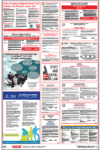Minnesota’s New Wage Theft Law

During Minnesota’s 2019 legislation session, Governor Walz signed a new law that criminalizes wage theft. The law also requires new notice and recordkeeping requirements. Effective July 1, 2019, Minnesota employers are required to provide a written notice to employees at the start of their employment. The notice must include the following information, which is in Read more


